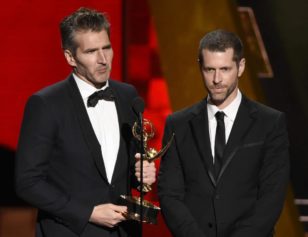Spoilers for last night’s Game of Thrones below:
“I think mothers and fathers made up the gods because they wanted their children tosleep through the night.” —Davos Seaworth
Davos is a lowborn smuggler, but partly because of that, he has something that counts as a luxury in the world of Game of Thrones: the freedom to love his children, and worry about them – and sadly, in his case, mourn them–as his children, not as assets or bargaining pieces. It is Davos, who lost a son, who is able to talk Stannis out of sacrificing his own blood (in the form of Gendry’s blood) in the interests of power and of his royal house. And it makes him one of the few moral lights of “Second Sons,” an episode very much about heredity and power, bad parents and traded-away children.
A bit of trivia about that title. The Second Sons, in this episode, are the mercenary company under contract to Yunkai. The Second Sons are in the original source novels, but Benioff and Weiss have done a little rejiggering here — in the books, Daario (the mercenary who crosses over to Dany) is a member of a different sellsword group, the Stormcrows. (I won’t go into the details of the switch here, and I ask fellow book-readers not to do so in the comments either.) I don’t know if they did it intentionally for thematic reasons, but the name change and title brought together the circumstances of many of the characters in this episode.
What is a second son, after all? He’s not the heir. He’s the spare. He might try to jump himself up, but as Renly Baratheon discovered, that’s frowned upon. He might—and one wonders if this is where the name comes from — go out and make his fortune in a mercenary company.
Or he might, like Tyrion, find himself married off unwillingly to an unwilling bride, while his father dismisses his accomplishments and his douchebag nephew takes away his stool and sniggers. As played by Peter Dinklage, Tyrion has been a delight for his swagger and wordplay. But Dinklage is excellent here in showing his cleverness failing him, as is Sophie Turner as Sansa, the other and even less powerful partner in this royal-breeding arrangement.
Sansa’s growth, from naive girl to wary but not wholly broken prisoner, has been something to watch, all the more so because Turner so often has to communicate Sansa’ feelings through what she doesn’t say.
In the grand scheme, as she’s admitted herself, she’s luckier than Margaery not to be marrying Joffrey (though she’s not free of his unwelcome attentions). But Tyrion is hardly her type himself, and letting him know that–”What if I never want you to?”–is the one measure of independence she’s still allowed.
Read More:entertainment.time.com


